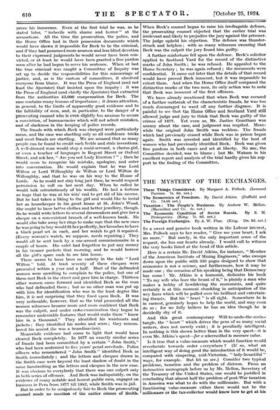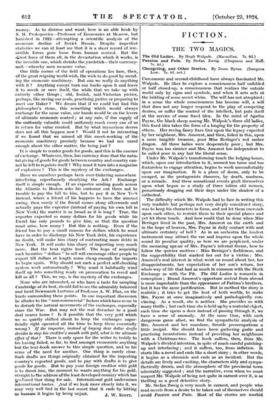THE MYSTERY OF THE EXCHANGES.
Taxation : The People's Business. By Andrew W. Mellon. (Macmillan and Co. 6s. net.) The Foreign Exchanges. By A. W. Flux. (King. 108. 6d. net.) IN a sweet and pensive book written in the Labour interest, Mrs. Pollock says to her reader, "Give me your heart, I ask no more." But surely, in the only important sense of the
request, she has our hearts already. I would call to witness the very books listed at the head of this article.
Here is a certain Mr. David Atkins, for instance, "Member of the American Institute of Mining Engineers," who swoops down upon the public with 350 pages designed to show that economics is not a science, and furthermore, how it may be made one ; the occasion of his speaking being that Democracy has come ! Mr. Atkins is a humorist, dedicates his book "To my wife who bore the brunt of it," is plainly a man who makes a hobby of bewildering the economists, and quite certainly is at this moment chuckling in anticipation of the wry faces which will be pulled over his brilliant and entertain- ing thrusts. But his " heart " is all right. Somewhere he is in earnest, genuinely hopes to help the world, and may even do so ; for we fully believe he has an idea though he is decidedly shy of it.
And this great contemporary Will-to-undo-the-social- tangle, the " heart " which drives the pens of so many social writers, does not merely exist ; it is peculiarly intelligent. In nothing is this shown better than in the very quest—it is even Mr. Atkins's quest—for a wherewithal to measure value.
Is it true that a value-measure which would function would reverberate towards order everywhere ? (If so, what an intelligent way of doing good the introduction of it would be, compared with simpering, mid-Victorian, " lady-bountiful " ways, for example. But let us see.) Consider two typical problems, taxation and the problem of distress. From an instructive monograph before us by Mr. Mellon, Secretary of the Treasury of the United States, one would be justified in concluding that almost half the problem of post-War taxation in America was what to do with the millionaire. But with a functioning value-measure either there would not be the millionaire or the tax-collector would know how to get at his
money. As to distress and want, here is an able book by S. M. Prokopovicz—Professor of Economics at Moscow, but banished in 1922—attempting a scientific analysis of the economic decline of Soviet Russia. Despite imperfect statistics we can at least see that it is a sheer record of irre- sistible forces gone loose from human control. But the ("•;rest force of them all, in the devastation which it works, is the invisible one, which shrinks the yardstick—their currency- unit—whereby men measure value.
One little corner of the field of operations lies here, then, oT the great reigning world-wish, the wish to do good by mend- ing the economic machinery. But can we really do anything with it ? Anything except turn our backs upon it and leave it to wreck or save itself, the while that we take up with entirely other things ; old, foolish, mid-Victorian pieties, perhaps, like saving our souls, practising justice or preparing to meet our Maker ? We dream that if we could but find this philosopher's stone, this something which would always exchange for the same value, our hands would be on the levers of ultimate economic control ; at any rate, if due supply of the uniformly valuable could uniformly reach every one of us in return for value created. But by what myscerious decree does not all this happen now ? Would it not be interesting if we found that we missed all this sweet-working of the economic machinery precisely because we had not cared enough about the other matter, the being just ?
It is simple to render goods for goods, and this is the essence of exchange. Whatever, then, has currency done that the natu- ral giving of goods for goods between country and country can- not be left to regulate itself ? Why must it turn into a magazine of explosives ? This is the mystery of the exchanges.
Have we ourselves perhaps been over-tinkering somewhere interfering, superfluously steadying the Ark ? Exchange itself is simple enough. If an exporter sending goods across the Atlantic to Boston asks his customer out there not to trouble to pay the bill to him, but to pay it in New York instead, where a friend of his happens to have the amount owing, then surely if the friend comes along afterwards and actually pays the exporter (instead of paying his own bill in New York) the matter is as broad as it is long ? True, the exporter expected so many dollars for his goods while his friend has only pounds to give him, so that the question must arise, how many ? But this is nothing. Even if the friend has to pay a small ransom for dollars which he must have in order to discharge his New York debt, his experience no doubt, will make him chary of contracting more debts in New York. It will make him chary of importing very much more. But the boat rights itself. The hope of acquiring such lucrative" dollars "to sell will encourage other people to export till dollars at length come cheap enough for imports to begin again. Why should not such a perfect self-checking system work automatically ? Why must it habitually wind itself up into something ready on provocation to recoil and kill us all ? This, we say, is the mystery of the exchanges.
None who are interested, or who have a taste for sampling Cambridge at its best, should fail to see the admirably balanced and lucid Newmarch Lectures of Professor A. W. Flux, on the knots surrounding these points. In one important discussion he alludes to the "non-commercial " factors which have come in to disturb the natural movements of the exchanges, especially since the War. But may not the real disturber be a good deal nearer home ? Is it possible that the very gold which we so quietly shifted about to keep the exchanges super-
ficially right operated all the time to keep them essentially wrong ? If the importer, instead of buying dear dollar drafts decides to stop his creditor's mouth with gold, what is the ultimate effect of that ? There is only space for the writer to testify to his having failed, so far, to find amongst economists anything
but the text-book answer to this simple question, and to his
sense of the need for another. One thing is surely clear. Such drafts are things originally obtained- for the importing
country's exported goods, and to pay with drafts is to give goods for goods. - But to pay your foreign creditor with gold is to direct him, the moment he wants anything for his gold,
straight to the address of the least developed country which has rogueed that thing for sale. International gold undermines international barter. -jAnd if we look more closely into it, we may very well find in the last resort that it ends by hitting us because it begins by being unjust. J. W. Scorr.



























































 Previous page
Previous page